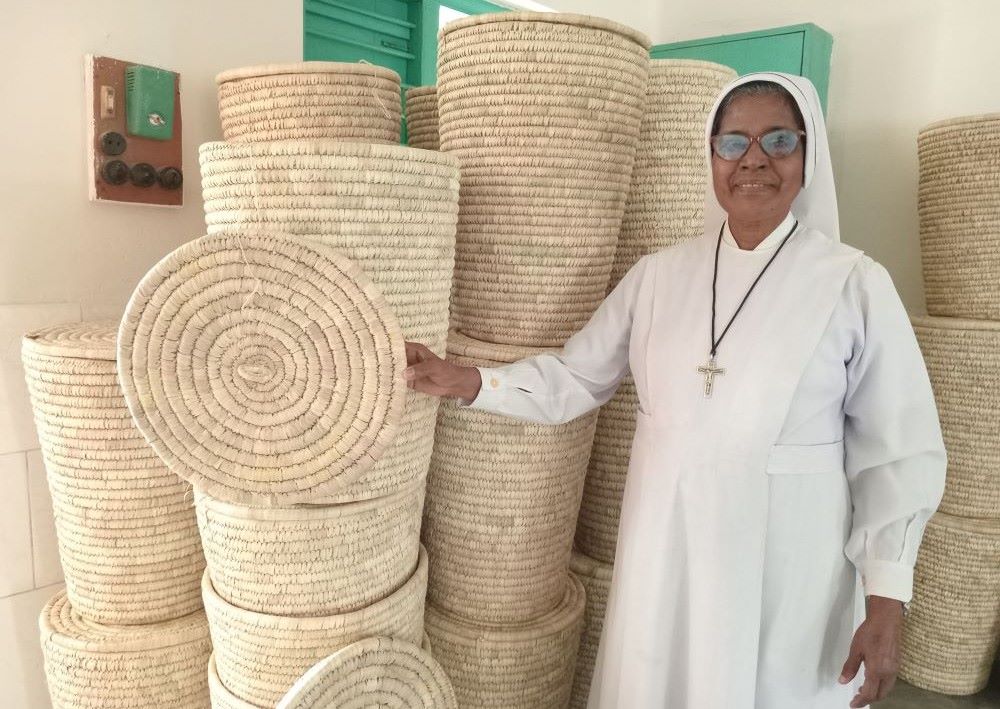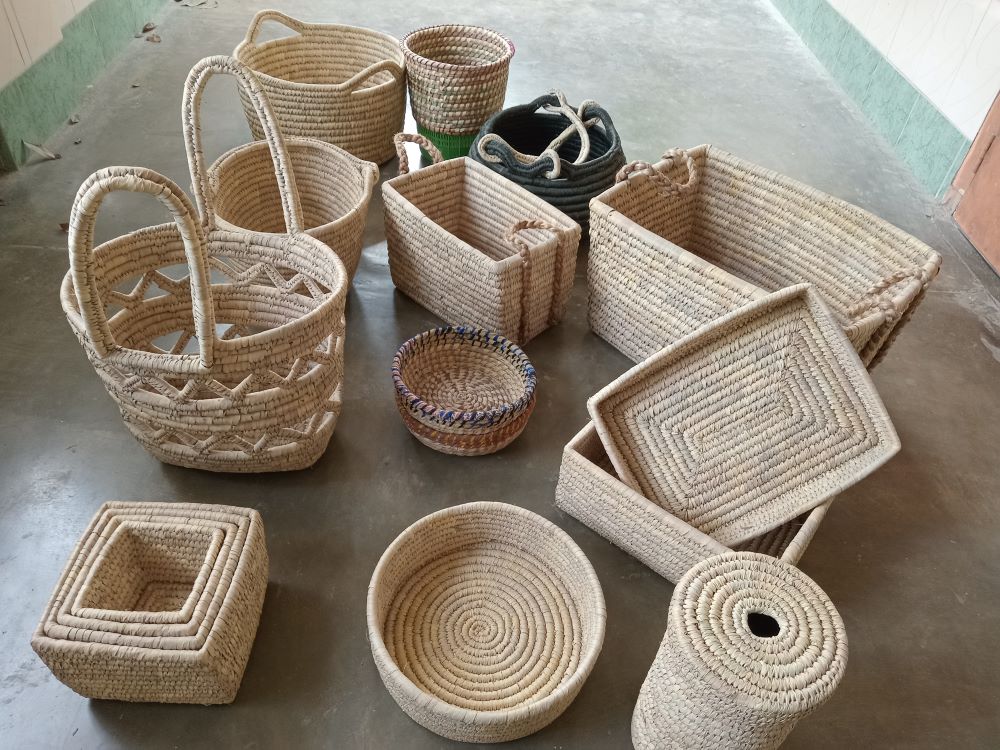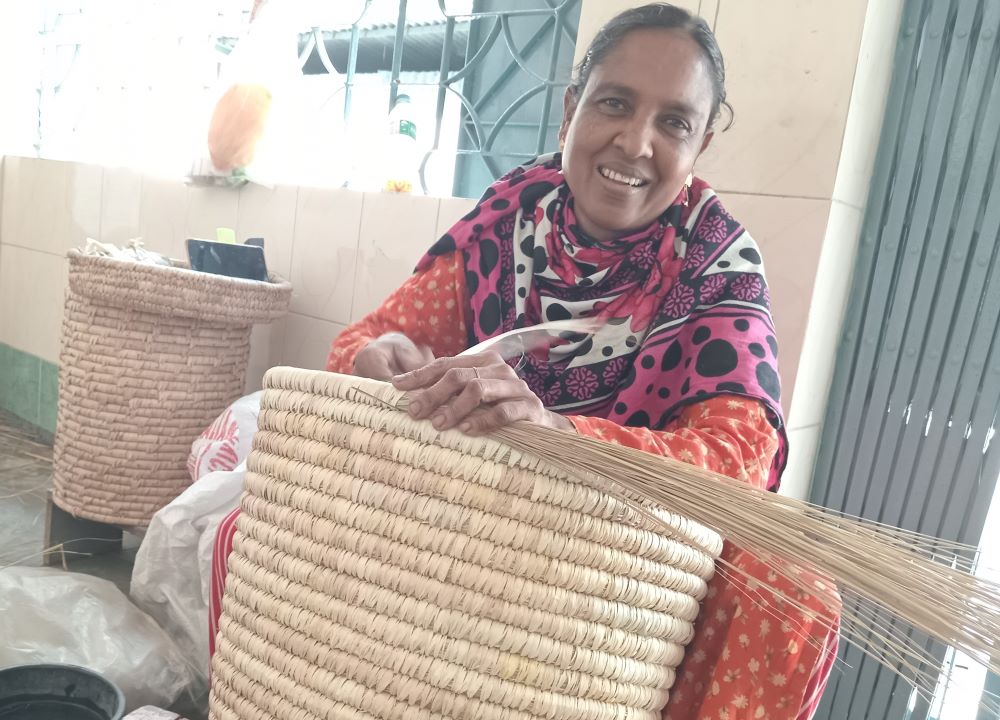
Sr. Jacinta Costa, a member of the Sisters of Charity of Sts. Bartolomea Capitanio and Vincenza Geroza, stands with products women make at Valerian Handicrafts Centre in Jessore, Bangladesh. Sales of the products help the women become self-sufficient and support their families. (GSR photo/Sumon Corraya)
Hundreds of impoverished women have become self-sufficient through a sister-run handicraft program. Once ignored by relatives and society, the women can now provide basic needs for their family members.
"I used to go to priests or nuns to borrow money when any family members would become sick; now, I don't go to them. I have deposited money and can afford my family members' treatment," Cicilia Biswas told Global Sisters Report. The 68-year-old Catholic woman lives at Our Lady of Rosary Church of Shimulia parish in Jessore, southwestern Bangladesh.
She is among the 300 artisans who work for Valerian Handicrafts Centre. where women produce products with natural materials such as date leaves and grass. Artisans craft items such as laundry baskets, fruit baskets, tiffin baskets, picnic baskets and more. The Handicrafts Centre was established in 1974 by Fr. Valerian Cobbe, an Italian missionary who was a member of the Society of St. Francis Xavier. The Handicrafts Centre is run by the Sisters of Charity of Sts. Bartolomea Capitanio and Vincenza Geroza.
Biswas, a widowed mother of two, has been involved in the center for 50 years. "My husband was very poor. Nuns inspired me to learn to work in the center. We worked and educated our children. Now they are well established," she said.

Artisans at Valerian Handicrafts Centre in Bangladesh produce items such as laundry baskets, fruit baskets, tiffin baskets and picnic baskets that they can sell. The center, run by the Sisters of Charity of Sts. Bartolomea Capitanio and Vincenza Geroza, helps women become self-sufficient. (GSR photo/Sumon Corraya)
About 70% of the population in Bangladesh works in agriculture and about 830,000 women are jobless.
Besides helping women become self-sufficient, the sisters at the Handicrafts Centre also provide the women with the right education to take part in decision-making in family and society.
"My husband left me with merely taka 200 (US$2). At that time, I was pregnant. However, I learned to work with nuns and become self-sufficient," said China Begume, 36, a divorced Muslim woman "I had no land, so I bought land and built a house for me and my son. If the center wouldn't have helped me, I might not have become self-supported."
Begume said that she stands beside female victims of abuse to get justice.
"My husband didn't take my responsibility, but I encourage women to get justice if they become a victim by their husband," Begume said, adding she gained strength because of her involvement with the Handicrafts Centre.
Another Muslim widow, Jorina Begume, 54, couldn't complete her studies, but has educated her two children with help from the center. "If this Valerian Handicraft Centre hadn't been established, I couldn't manage medicine and nutritious food for my children," she said. "My day laborer husband didn't have the ability to manage it."
Catholic Rose Biswas has been involved in the Handicrafts Centre since childhood.
"I came to the center with my mom, and later, after completing 10th grade, I joined the center as staff. I become solvent by doing work here and like me, hundreds of women are happy as they brought prosperity in their lives," Biswas, 65, told GSR.
She is a quality controller at the Valerian Handicrafts Centre, providing education and support to the women there. "My nephew did a good job and established a beautiful house, and he is grateful to me as I gave support to him during his student life," Biswas said.

Saphya Khaton makes a laundry basket out of natural materials at Valerian Handicrafts Centre in Jessore, Bangladesh. The center, run by the Sisters of Charity of Sts. Bartolomea Capitanio and Vincenza Geroza, helps women become self-sufficient. (GSR photo/Sumon Corraya)
The center is run by Sr. Jacinta Costa, a member of Sisters of Charity of Sts. Bartolomea Capitanio and Vincenza Geroza. Costa told GSR that their products, made with natural materials, are in huge demand locally and internationally.
In 1974, the sisters started teaching impoverished women sewing, but one day a woman showed baskets made of date leaves and grass.
"We, nuns, observed that such kinds of baskets would have market demand," said Costa, who has run the center for the last 10 years. "We started searching for a buyer and we obtained one. And then we have started to use these local resources that come from nature and are environment friendly."
Advertisement
She also told GSR that Christian women used to labor on farmland, but half the time, they were jobless.
"They faced crises for basic needs such as food, treatment and clothes, but now they can save money and send their children to school. Many artisans' children finished their higher studies and are now established in their lives," Costa explained."We always get orders, and our artisans stay busy. Sometimes we don't get many orders as we lack artisans."
Some NGOs, such as CORR-The Jute Works — a trust of Caritas Bangladesh, Head Handicraft, and some other organizations — take orders from abroad, and the nuns' center creates the products.
"These products don't have much demand in Bangladesh, but people of Europe and Canada like these very much," Costa said.







